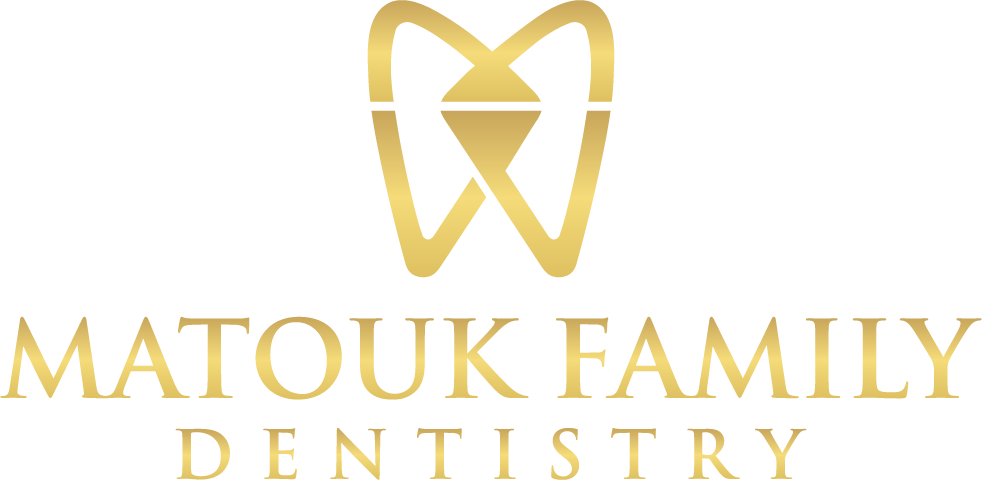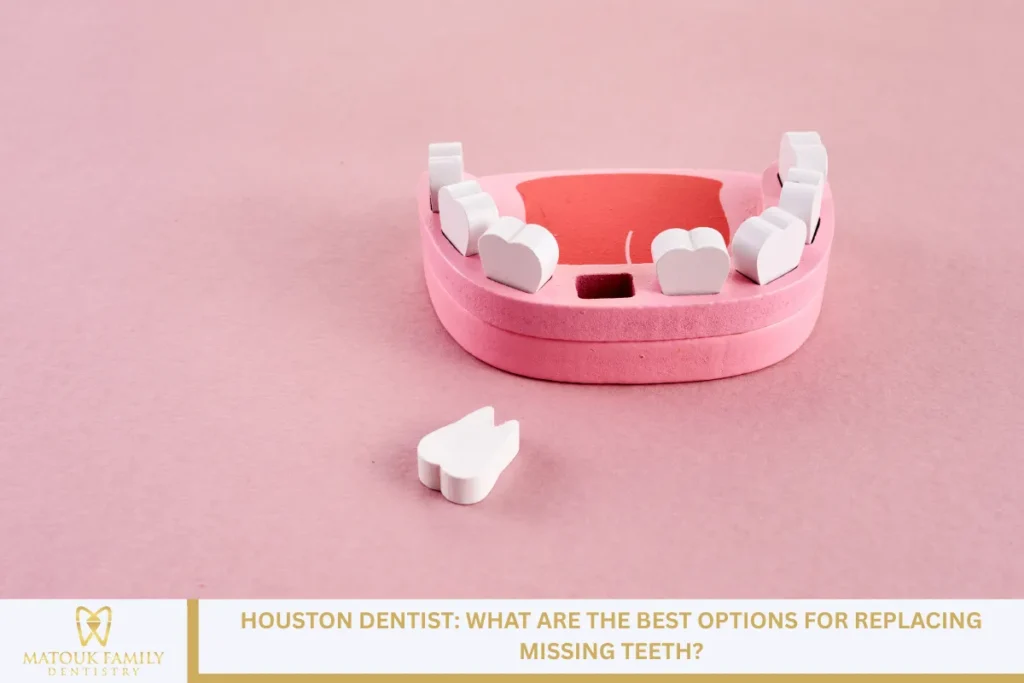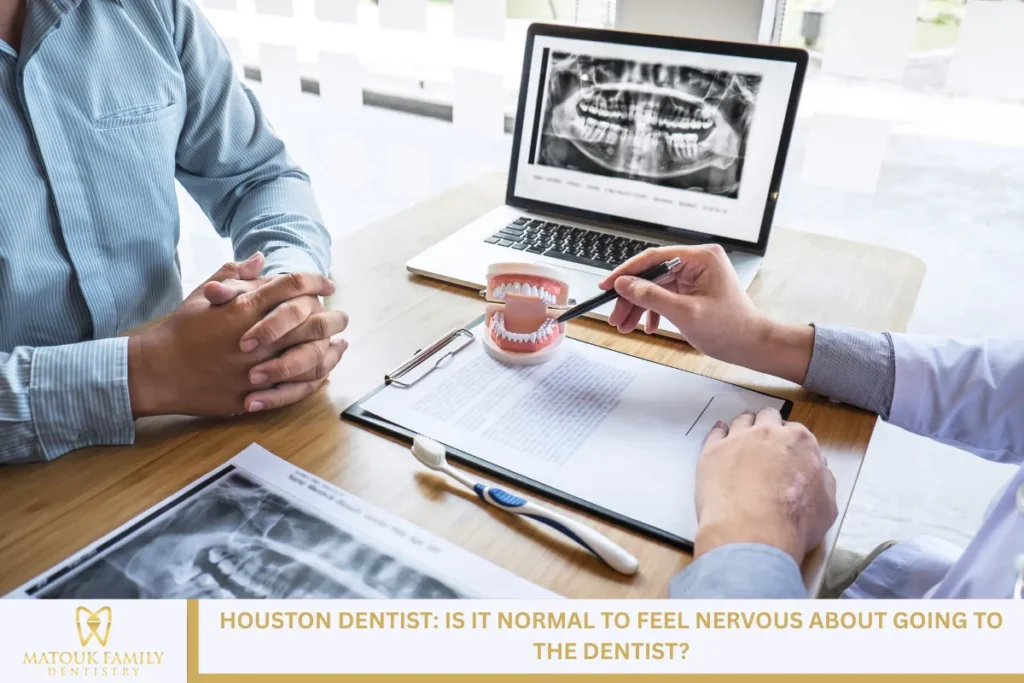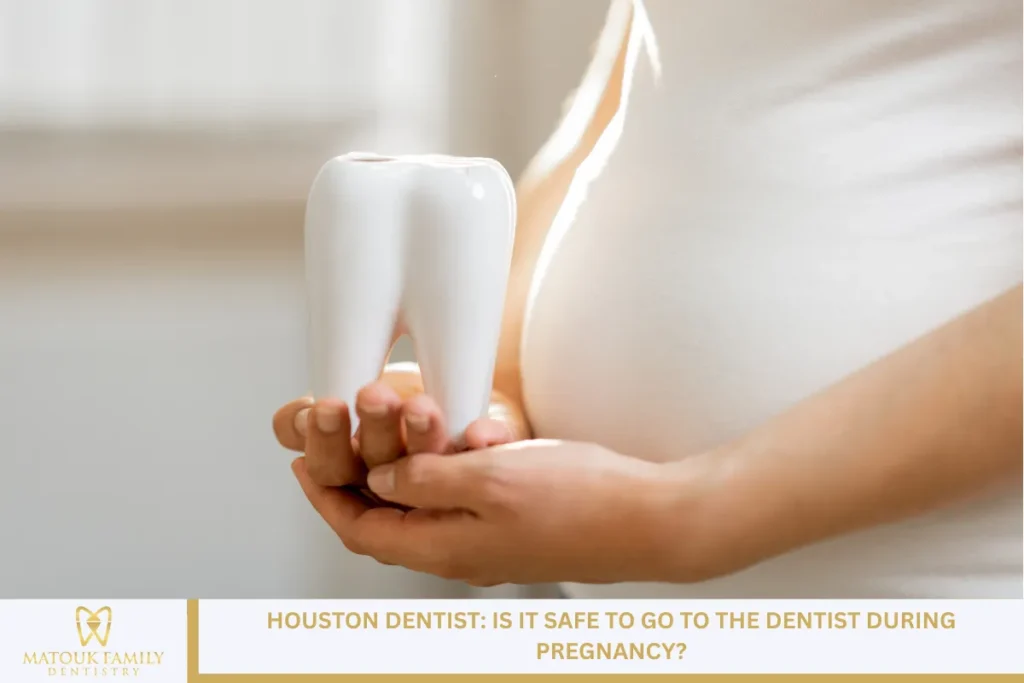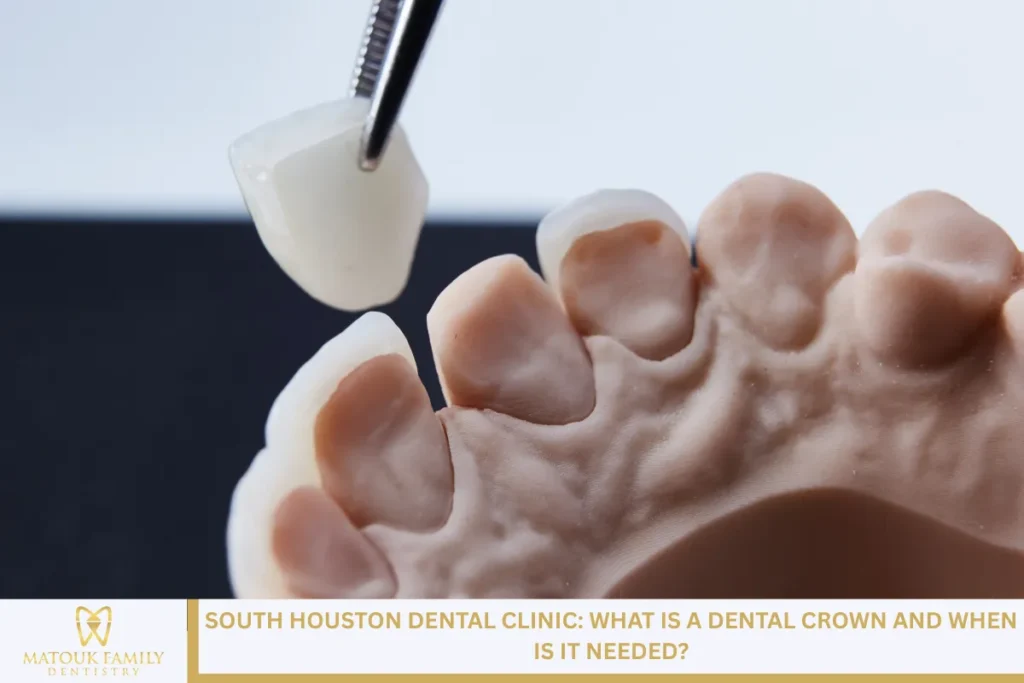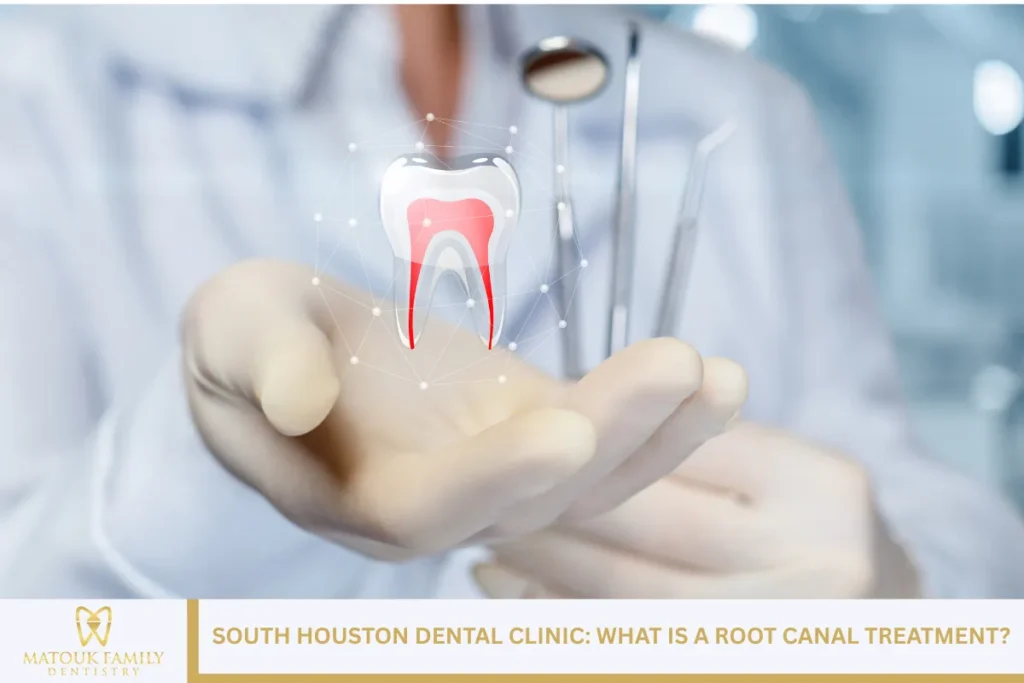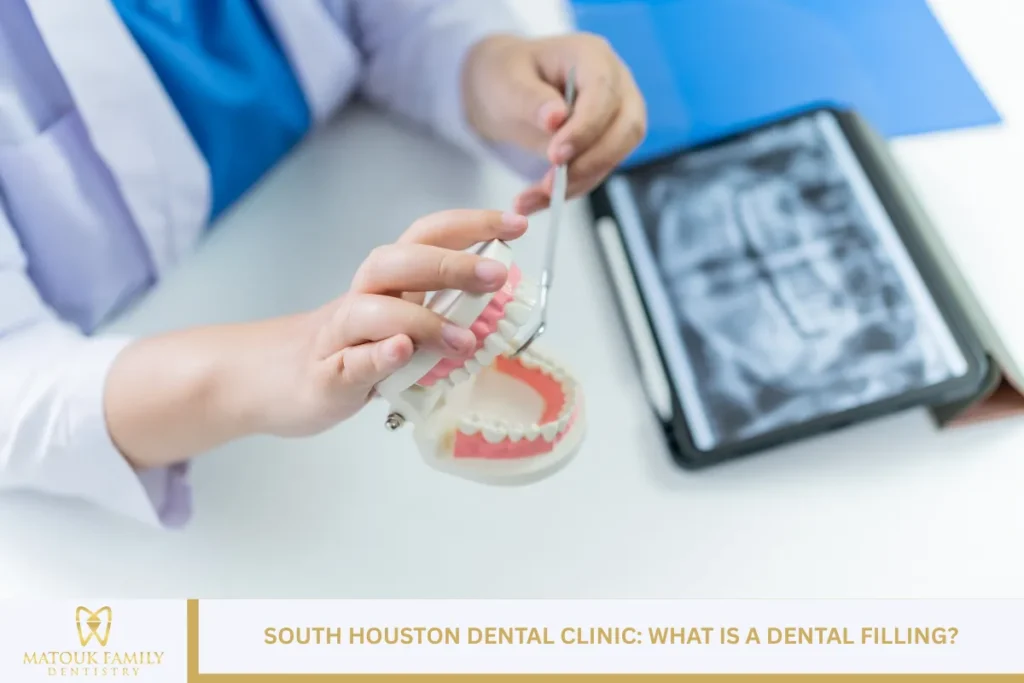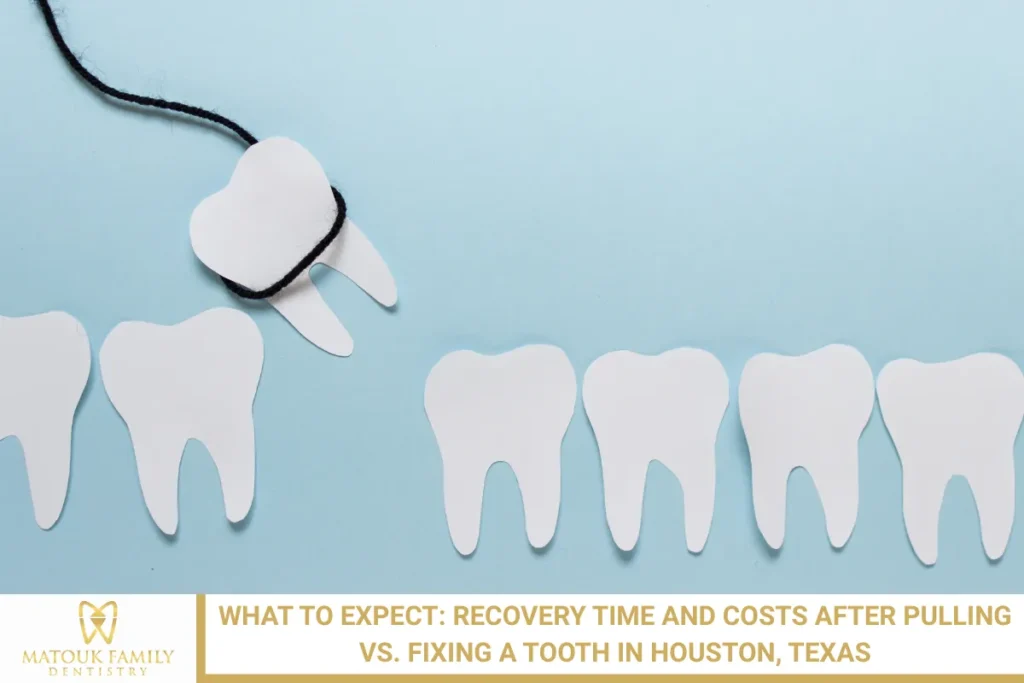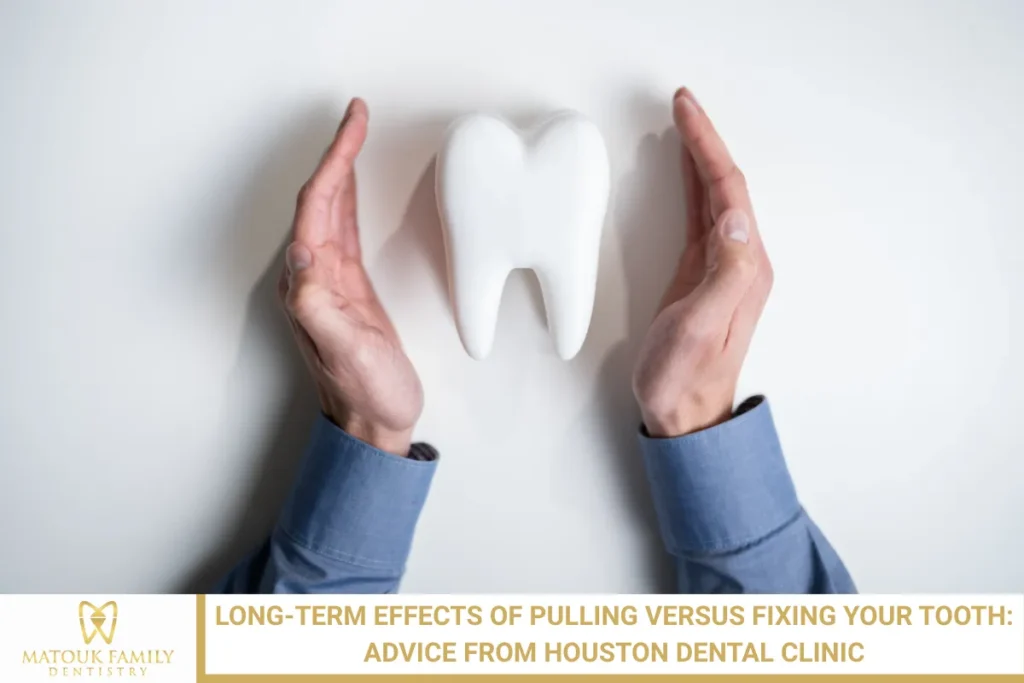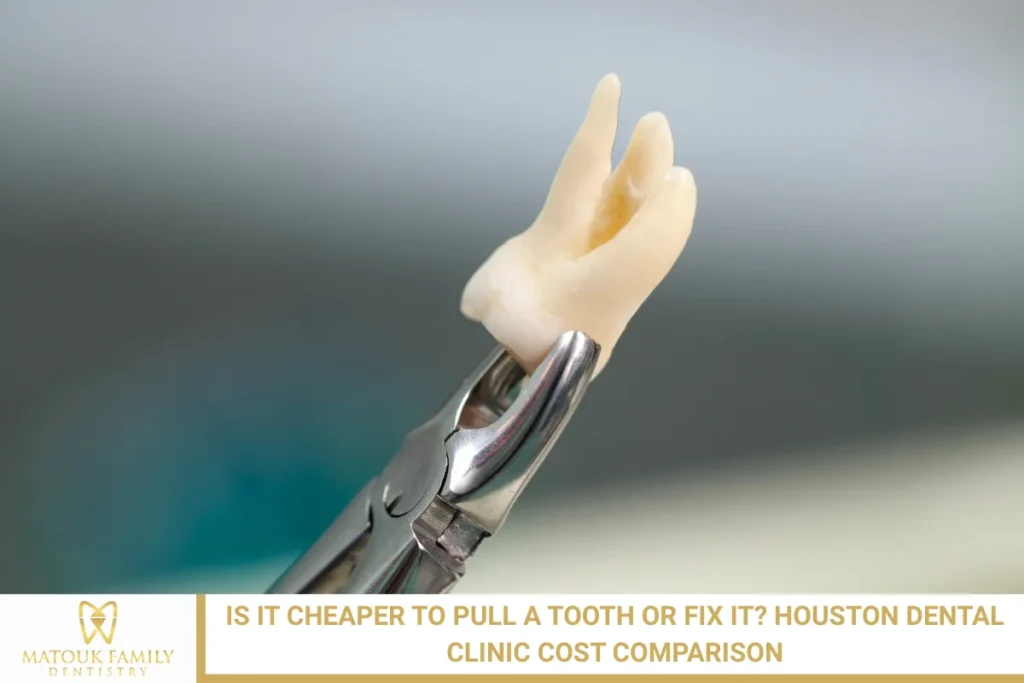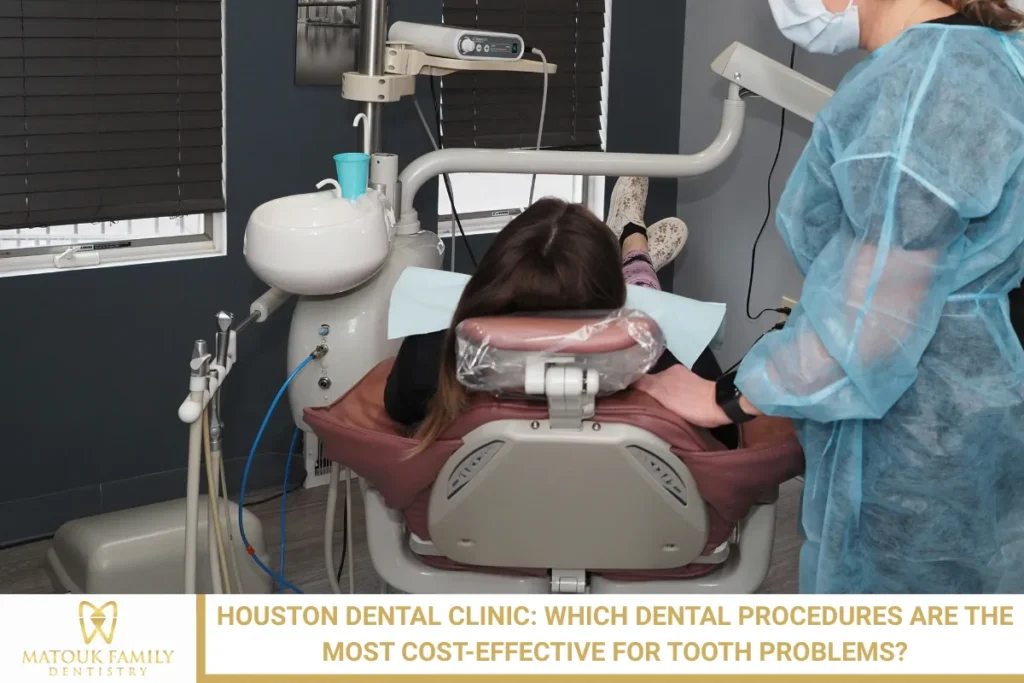Maintaining oral health is essential, and choosing between natural care and professional help can be a confusing decision. In many households, the debate over whether to rely on home-based remedies or visit a dental clinic regularly often sparks discussion. While both options aim to support oral hygiene, their effectiveness, cost implications, and long-term impact vary greatly.
This article provides a comprehensive comparison between common home remedies and professional dental care, specifically tailored to residents of Houston, TX. The goal is to help individuals understand which approach not only saves more money but also offers better protection for their teeth and gums over time.
Understanding Home Remedies for Dental Health
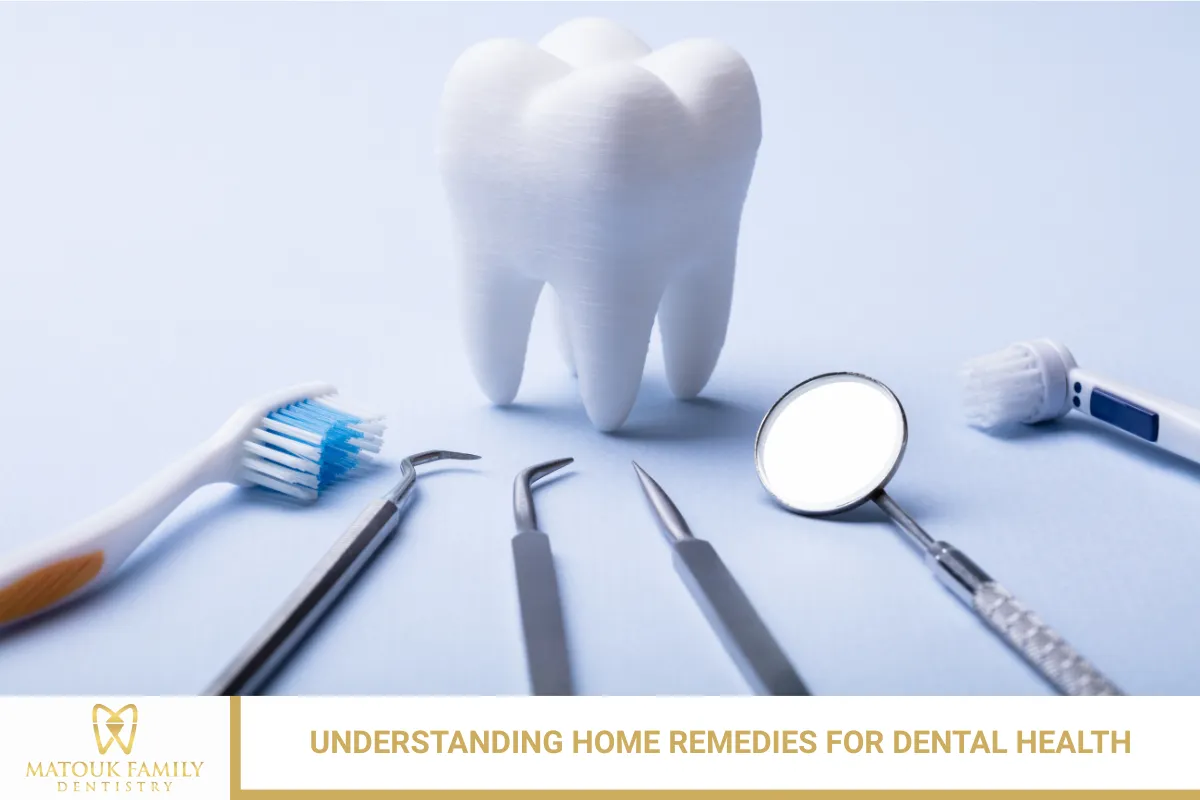
Home remedies for dental care have been used for centuries. They are typically passed down through generations and are made from natural or over-the-counter substances. The appeal of home remedies often lies in their affordability and accessibility. People tend to believe that if something is natural, it’s safer. However, not all home treatments are created equal, and their effectiveness can differ depending on the condition being treated.
Some widely used home remedies for oral care include rinsing with salt water, brushing with baking soda, using hydrogen peroxide for whitening, applying clove oil for toothaches, and oil pulling with coconut or sesame oil. These methods can offer short-term relief or serve as supplements to daily hygiene routines. Still, they are not designed to replace proper dental evaluations and procedures. For instance, salt water can reduce minor inflammation, and baking soda may help polish surface stains. Still, neither can treat cavities or detect oral diseases.
Additionally, certain remedies may have side effects if misused. Hydrogen peroxide, for example, can irritate soft tissues if too concentrated. Similarly, baking soda is abrasive and may damage enamel when used too frequently. These risks underscore the importance of exercising caution when utilizing home-based alternatives without expert guidance.
Exploring Professional Dental Care in Houston
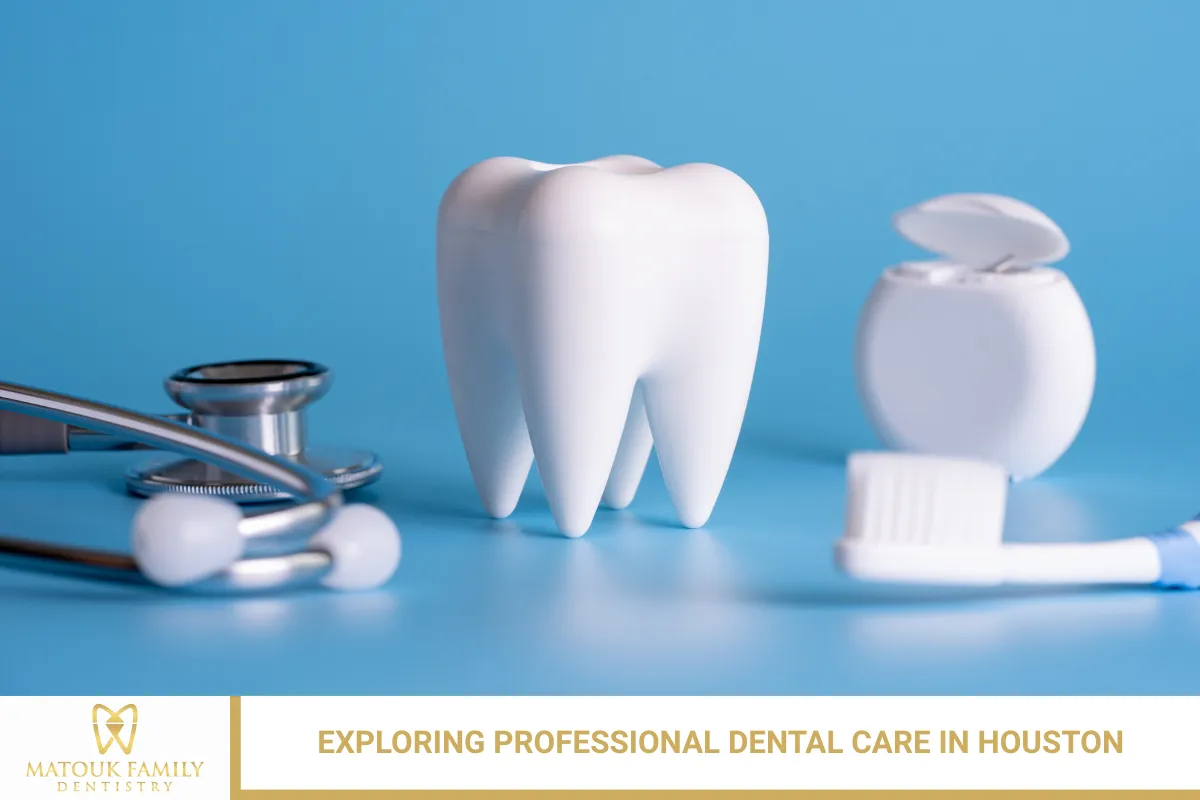
Professional dental care involves trained practitioners utilizing medical-grade tools, technology, and expertise to manage and enhance oral health. Unlike home remedies, dental services encompass preventive, diagnostic, and corrective measures. Clinics in Houston offer a wide range of treatments designed to maintain healthy teeth and gums while addressing issues that may arise.
Routine services provided by dental clinics include comprehensive oral examinations, digital x-rays, professional cleanings, fluoride applications, and gum evaluations. These services help identify problems such as cavities, gum disease, or structural damage before they become severe. Professional cleanings, in particular, remove hardened plaque (tartar) that brushing at home cannot eliminate.
Beyond routine care, Houston dental clinics are equipped to handle a range of restorative and cosmetic treatments, including fillings, crowns, root canals, dental implants, dentures, and whitening procedures. Oral cancer screenings are also part of standard dental exams, ensuring that early warning signs are not overlooked. These services are critical because many dental issues do not present symptoms until they have progressed to a more serious stage.
By visiting a dental clinic regularly, patients receive personalized advice, tailored treatment plans, and continuous monitoring, which together form a strong foundation for lasting oral health. This level of care cannot be matched by home remedies, regardless of how consistent or traditional the method may be.
Cost Considerations Between Home Remedies and Dental Clinics
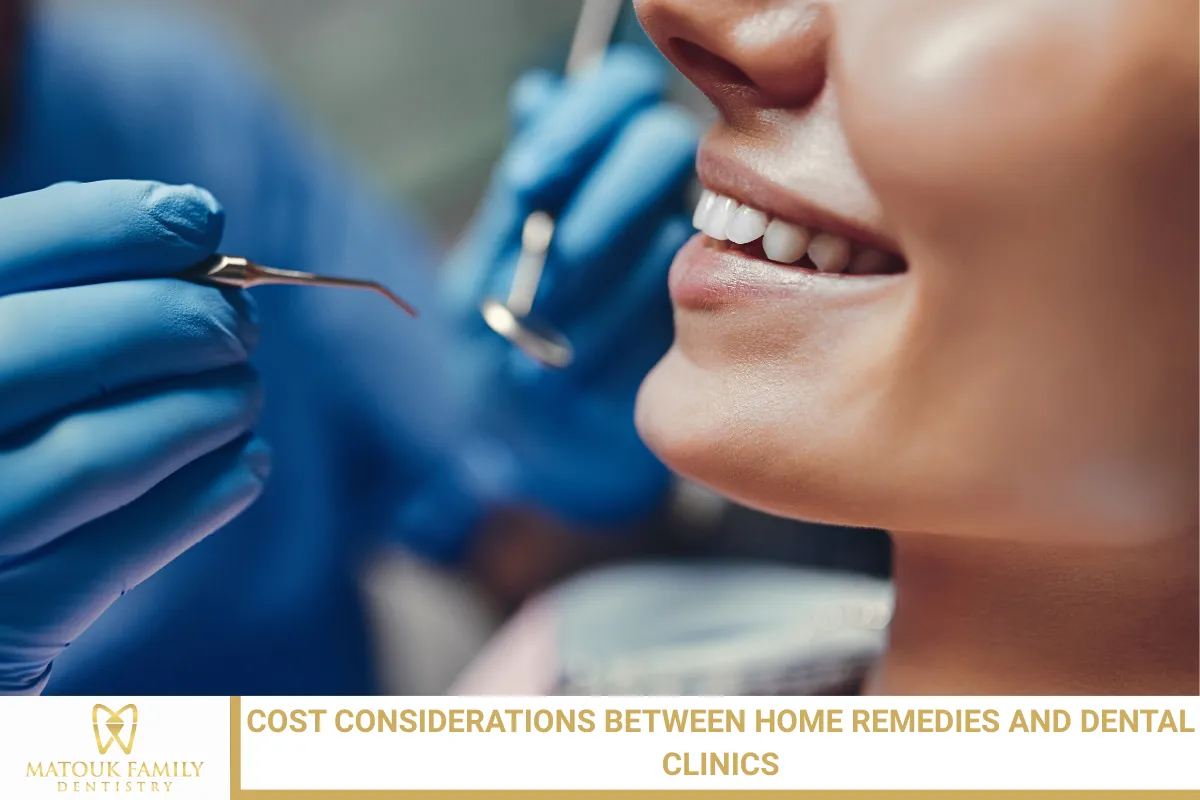
One of the most significant reasons individuals turn to home remedies is to avoid the perceived high cost of dental treatment. Home care appears to be a budget-friendly option. Common supplies such as salt, baking soda, hydrogen peroxide, and coconut oil cost very little. A person could spend less than $100 annually relying on these options.
However, this approach does not account for the hidden costs of neglect. While home remedies may manage surface-level symptoms or maintain cleanliness, they do not address the underlying causes of tooth decay, infection, or gum disease. Without proper diagnostics, small issues can grow unnoticed and lead to more expensive treatments later.
In contrast, regular dental visits in Houston can range from $100 to $250 per visit for cleanings and exams, which are typically recommended twice a year. These appointments may seem costly initially, but they often include preventive measures that protect against major oral health complications. When caught early, a cavity may be treated with a simple filling for a few hundred dollars. Left untreated, that same issue may require a root canal and crown, costing upwards of $1,500.
In this light, professional dental care, though more expensive upfront, becomes more cost-effective in the long run. It helps avoid emergency procedures, which are often painful and financially draining. Additionally, many dental clinics in Houston offer flexible payment plans, sliding scales, and financing options to make care more affordable and accessible.
Effectiveness and Results: A Clear Divide
Effectiveness is where the biggest gap lies between home remedies and dental clinic care. While natural solutions can provide temporary relief or contribute to daily hygiene, they do not offer a definitive treatment for diagnosed dental issues. Rinsing with salt water may reduce gum swelling for a day. Still, the same inflammation could be a symptom of gingivitis, which requires professional intervention.
Dental professionals adhere to evidence-based practices, utilizing scientifically tested tools and materials. Fillings, for example, not only stop decay but also restore function and structure to the tooth. Crowns protect damaged teeth from further harm. Deep cleanings remove bacteria from below the gum line, preventing periodontal disease. No amount of oil pulling or brushing with baking soda can offer these results.
Moreover, dentists are trained to detect early signs of serious conditions that can’t be seen in a mirror. Problems like bone loss, abscesses, or oral cancer often go unnoticed until they are advanced. Early detection saves not only money but also lives.
Health Risks of Avoiding Professional Dental Care
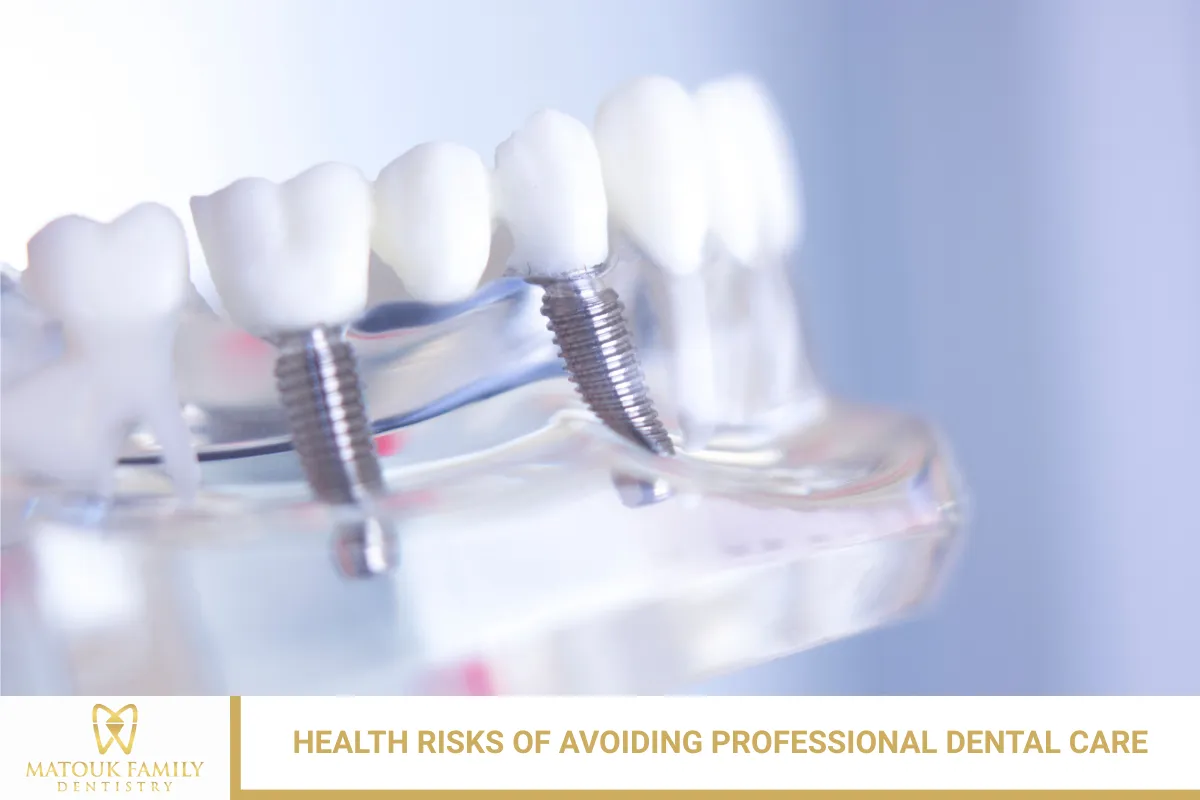
Skipping visits to a dental clinic comes with serious risks. While discomfort might be manageable with home solutions for a time, untreated dental problems tend to worsen. Tooth decay doesn’t stop without intervention. Infected gums can pull away from teeth, leading to instability. Bacteria in untreated oral infections can spread to the bloodstream, leading to severe systemic health conditions.
Some individuals may assume that brushing and flossing, along with natural rinses, are enough to avoid problems. Unfortunately, dental issues often progress silently. By the time noticeable pain or swelling occurs, treatment may require surgery or tooth extraction.
In Houston, where access to modern dental facilities is widely available, delaying care due to fear, cost, or misinformation is unnecessary. Regular check-ups are the best defense against dental emergencies.
Environmental and Lifestyle Factors in Houston Affecting Oral Health
The local environment also plays a role in dental health. Houston’s humid and warm climate can impact hydration levels. Dehydration reduces saliva production, which is essential for washing away food particles and neutralizing acids. A dry mouth can lead to rapid plaque buildup and increased risk of decay.
Additionally, seasonal allergies are common in the region. Allergy sufferers often breathe through their mouths, especially while sleeping, which can exacerbate dry mouth. Many residents also consume iced drinks and sugary snacks to combat the heat, which can increase the risk of enamel erosion and tooth decay, also known as cavities.
Understanding how Houston’s climate affects oral hygiene can help individuals make more informed choices. Professional dental care providers take these factors into account. They can provide specific guidance based on local conditions, which general remedies cannot offer.
Consistency and Education as Key to Better Oral Health
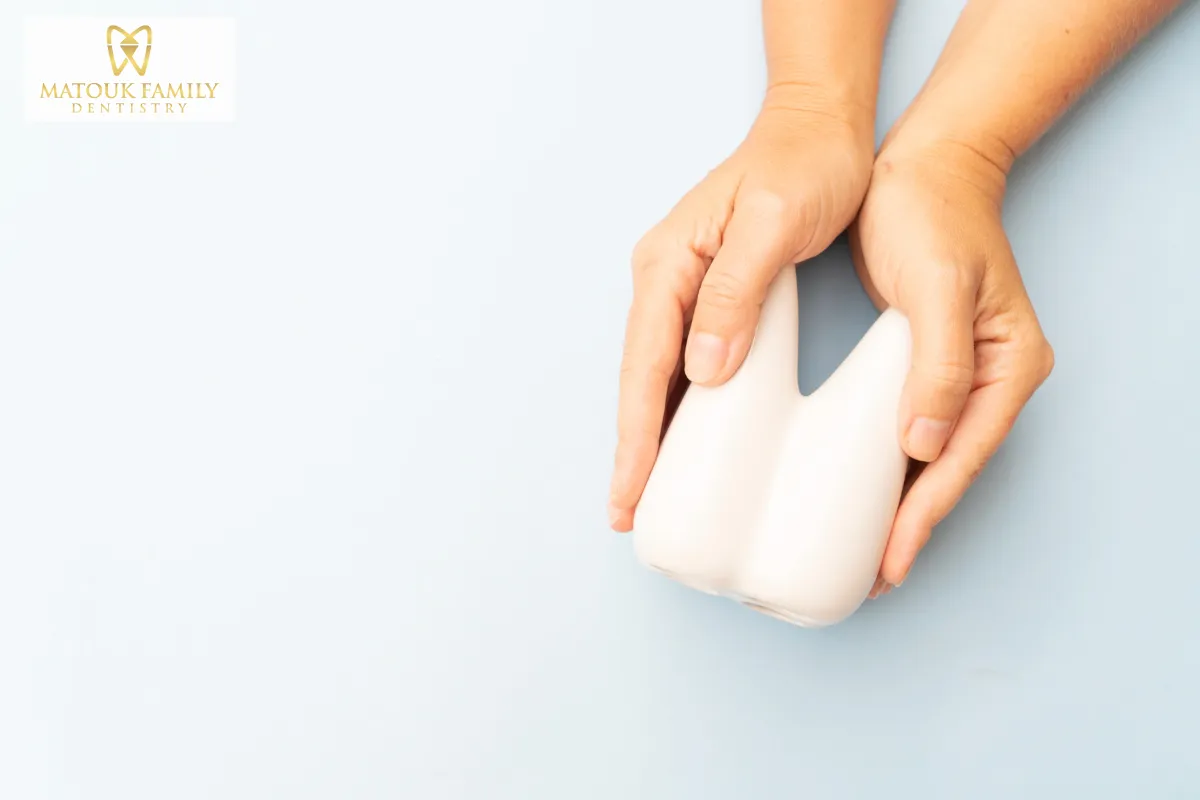
Consistency in oral hygiene practices is essential, regardless of the method used. However, pairing daily home care with routine professional visits ensures better outcomes. Brushing and flossing daily is vital, but these actions alone cannot remove tartar or catch issues developing beneath the surface.
Dental clinics also serve an educational role. They inform patients about proper brushing techniques, dietary habits, and habits to avoid (like grinding teeth or chewing ice). This personalized education empowers patients to make informed decisions about their future dental care.
In many cases, patients discover they’ve been making small mistakes—such as brushing too hard or using the wrong toothbrush—which can be corrected quickly with professional advice. This type of awareness helps prevent issues before they start.
Reliable Care Starts with Professional Help
Maintaining healthy teeth and gums involves more than occasional rinses or natural powders. It requires structured care, timely intervention, and expert evaluation. While home remedies may be easy and inexpensive, they should not be considered a complete solution to health issues.
The most effective way to safeguard your oral health is through a trusted dental clinic that offers comprehensive, science-backed care. In Houston, residents have access to top-tier dental services that not only prevent but also effectively treat conditions affordably over time.
Choosing the Smarter Path for Your Smile
Regular visits to a dental clinic combined with good habits at home form the foundation of strong oral health. Relying solely on home remedies may delay symptoms, but it will not prevent disease or correct damage. Ultimately, the longer one waits to seek professional care, the more difficult and expensive it becomes to restore proper dental function.
Choosing a well-rounded approach ensures cleaner teeth, healthier gums, and a sense of peace of mind. Professional dental care offers long-term benefits that natural remedies cannot guarantee. Protecting your smile should never be left to guesswork or short-term fixes.
Houston Dental Clinic – Matouk Family Dentistry
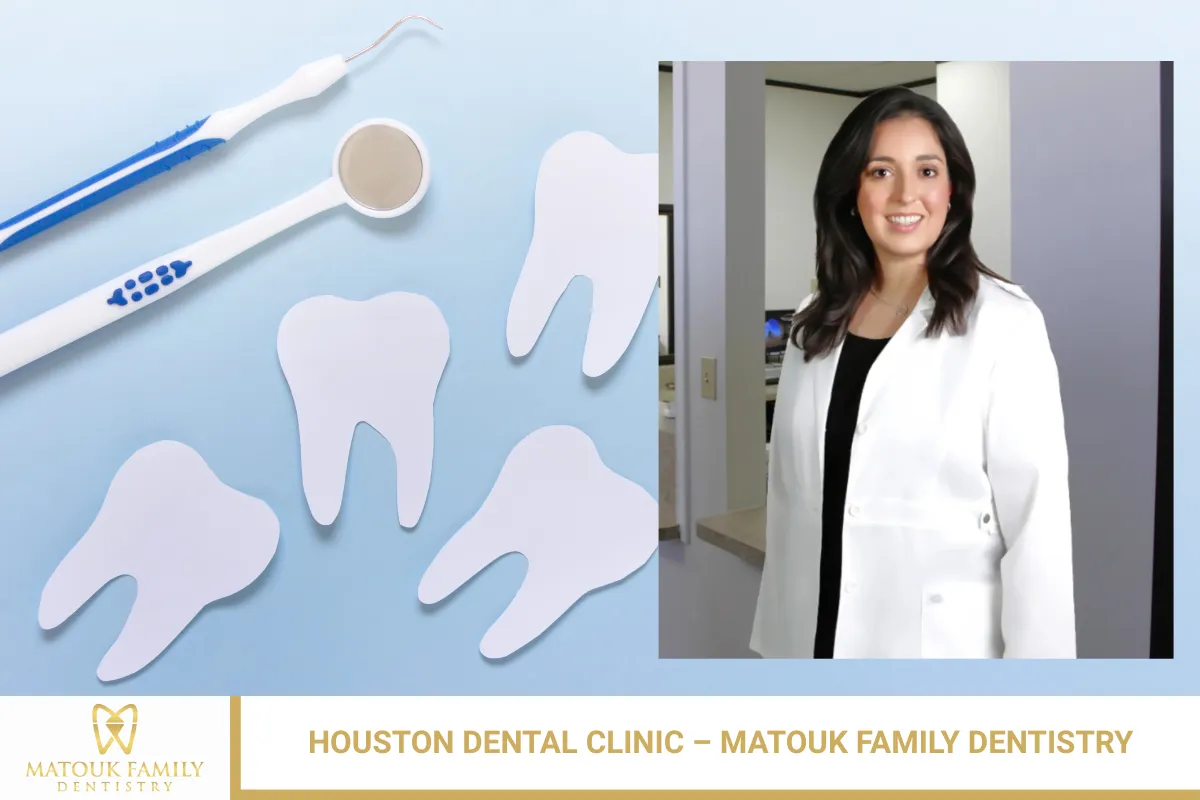
Matouk Family Dentistry is your trusted choice for comprehensive and reliable dental care in Houston. Conveniently located off the Gulf Freeway, our clinic welcomes individuals and families looking for personalized dental services in a comfortable setting. We offer a comprehensive range of treatments, from routine cleanings and check-ups to more advanced care, all tailored to your individual needs and preferences.
Our team is committed to creating a welcoming environment where patients feel at ease and fully informed about their oral health. Services include general dentistry, family care, dental fillings, crowns, implant restorations, dentures, root canals, and oral cancer screenings. To book an appointment or learn more about how we can assist you, please contact us at (281) 484-3675.
Frequently Asked Questions About Dental Care in Houston
1. How can I improve my oral hygiene at home and maintain healthy teeth between visits to the dental clinic?
Improving oral hygiene at home involves more than just brushing your teeth twice a day. Use a softer brush to protect your tooth enamel, and make sure to floss daily to remove plaque buildup in areas your toothbrush can’t reach. Rinse your mouth with a saltwater solution occasionally—it may help reduce minor irritations and provide relief from pain, especially if you have sensitive gums.
Avoid sugary foods and acidic beverages, as they can weaken the outer layer of your teeth. Drinking water, especially after meals, helps wash away bacteria and food particles. If you want a brighter smile, consider products for teeth whitening that use safe levels of carbamide peroxide—but always check with a professional dentist first to avoid bleach spots or damage.
Consistent preventive visits and proper home habits can significantly reduce your risk of unattended infections, gum health problems, or more serious dental concerns that may require clinical procedures later on.
2. What is the best treatment for toothaches, and are there safe temporary remedies?
Toothaches can arise from a variety of issues—ranging from cavities and fractures to periodontal infections and abscesses. The most important step is identifying the cause through a visit to a dental clinic. A professional dentist may use digital imaging to spot underlying problems such as a cracked tooth structure, infection, or impacted nerves.
As remedial steps before your appointment, there are a few safe, temporary fixes for toothaches. Rinsing with warm saltwater may help reduce swelling and combat infection. Applying a cold compress to the outside of the cheek can provide relief from pain and inflammation. Over-the-counter pain relievers can also be used, but they’re not a permanent fix.
Avoid placing aspirin directly on your gums, as it may cause burns to the soft tissue. While these quick fixes can ease discomfort, they are not substitutes for proper dental infection treatment, especially in the case of a spreading periodontal infection.
3. How does professional cleaning at a dental clinic benefit gum health and tooth enamel?
A professional dental cleaning goes beyond what you can achieve at home. Dental clinics in Houston often use ultrasonic scalers—high-frequency tools that safely remove hardened plaque (calculus) without damaging the tooth enamel or outer layer of your teeth. These devices also disrupt harmful bacteria that lead to gum disease.
Routine cleanings help prevent periodontal infections, which can cause loose teeth, bone loss, and even systemic health issues if left untreated. Your dentist may also apply a dental fluoride treatment, which helps reverse decay in its early stages and strengthens enamel.
By removing tartar and bacteria near the gumline, professional cleanings promote better gum health and reduce inflammation. Suppose early signs of gum disease are found. In such cases, the dentist may recommend scaling and root planing as a treatment for gum disease. This clinical procedure smooths the root surfaces, allowing the gums to reattach to the teeth.
Regular cleanings every six months, combined with strong home care habits, are essential for maintaining a brighter smile and promoting lasting oral health.
4. What are the signs of a dental emergency, and how should I respond before reaching a clinic?
A dental emergency refers to situations where immediate care is necessary to alleviate severe pain, stop bleeding, or save a loose or avulsed tooth. Common signs include intense, persistent pain; swelling of the face or gums; broken teeth; or a knocked-out tooth.
If you have an avulsed tooth, gently rinse it without scrubbing, and then try to place it back in the socket. If that’s not possible, store it in milk and visit a dental clinic as soon as possible. Applying a cold compress can help reduce swelling and discomfort associated with trauma or fractures.
For sudden dental infections, visible abscesses, or spreading pain, seek emergency dental care right away to prevent serious complications. Unattended infections can have a systemic impact on the body, affecting multiple organs and overall health.
While quick fixes like saltwater rinses and OTC medications may offer temporary comfort, they are not permanent solutions. Timely care ensures proper healing and prevents the condition from worsening.
5. What is cosmetic dentistry, and how does it differ from general dental treatment?
Cosmetic dentistry focuses on enhancing the appearance of your teeth, gums, and smile, while general dental treatment addresses functionality, health, and disease prevention. Both areas overlap in some ways but serve different primary goals.
Procedures in cosmetic dentistry include products for teeth whitening, dental fluoride treatment for luster, veneers to improve shape or alignment, and crowns or bonding to fix chips and discoloration. Many whitening treatments use carbamide peroxide to gently lift stains from enamel, resulting in a brighter smile.
In contrast, general care involves routine cleanings, fillings, root canals, and dental infection treatments aimed at preserving your tooth structure and preventing future complications. A professional dentist may recommend combining cosmetic and restorative procedures if your teeth have both health issues and aesthetic concerns.
While cosmetic treatments are often elective, they still require proper evaluation to avoid damage to the outer layer or enamel. Trusting experienced professionals ensures results that are both attractive and safe.
Read more: Houston Dental Clinic: Which Dental Procedures Are the Most Cost-Effective for Tooth Problems?
